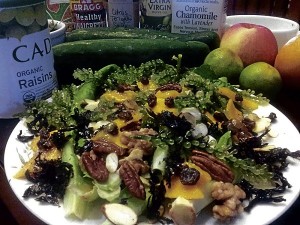Experts share tips on how to stop cancer via diet
Cancer has become a dreaded household word, with almost everyone having known a relative or friend suffering from the disease. Yet, focus has been directed largely at the cure rather than prevention. While there have been studies on the role of stress, lifestyle and environment in the trigger, onset and progression of the disease, that of diet has still been largely unexplored by mainstream medical science.
Inquirer Science and Health interviewed scientist T. Colin Campbell, a Jacob Gould Schurman professor emeritus of nutrition biochemistry of Cornell University, scientist Bharat B. Aggarwal of the University of Texas MD Anderson Cancer Center, Dr. Samuel Epstein, toxicologist and professor of occupational and environmental medicine at the University of Illinois School of Public Health, former Health Secretary Dr. Jaime Galvez Tan, integrative medical doctor Omar Arabia and other medical professionals. They shared their “secrets” on how to prevent cancer through diet.
The physicians committee for responsible medicine in its “Cancer Facts: Meat Consumption and Cancer Risk” article discussed the carcinogenic compounds in cooked meat. Heterocyclic Amines, a family of mutagenic compounds, are produced during the cooking process of many animal products, including chicken, beef, pork and fish. The article, which came out in the T. Colin Campbell Foundation website, said that even meat that is cooked under normal grilling, frying, or oven-broiling may contain significant quantities of these mutagens. The longer and hotter the meat is cooked, the more these compounds form.
In some studies, grilled chicken has formed higher concentrations of these cancer-causing substances than other types of cooked meat.
Role of diet
“If Filipinos decided to eat plant-based diets and seriously rejected fast-food chains, they would gain much stature, more health, and be much richer and independent in the future,” Campbell told Inquirer. The book “The China Study: Startling Implications for Diet, Weight Loss and Long-Term Health” which he coauthored with physician Thomas M. Campbell II, cited the role of diet in preventing the disease. “Animal protein increases the levels of a hormone, IGF-1, which is a risk factor for cancer, and high casein (the main protein of cow’s milk) diets allow more carcinogens into cells, which allow more dangerous carcinogen products to bind to DNA, which allow more mutagenic reactions that give rise to cancer cells, which allow more rapid growth of tumors once they are initially formed.”
It stresses that genes by themselves do not determine the onset of disease. Rather, they are activated, or expressed, and nutrition plays a critical role in determining which genes, good and bad, are activated.
Epstein, said in his book, “The Breast Cancer Prevention Program,” that a diet high in calorie and animal fat represented two major risk factors for breast cancer—obesity and exposure to carcinogenic and estrogenic industrial chemicals in animal fat. A low-calorie, low-animal-fat diet rich in fiber, vitamins, minerals and antioxidants offers the best protection against these diet-related risks, he said.
Dr. Jaime Galvez-Tan said that “Fresh vegetables and fruits are full of antioxidants that fight all the carcinogens we encounter every day. These are also high in fiber, which can help prevent chronic diseases such as cardiovascular disease, diabetes and obesity. There is also some evidence that high-fiber diets decrease chances of cancer,” he said. Galvez-Tan stressed the avoidance of animal meat, especially processed meat; animal milk and milk products like butter and shell fishes.
Dr. Omar Arabia, a medical doctor “of last resort” who practices integrative medicine, cites several studies that point to animal meat’s deadly putrefaction in the human body’s digestive system.
Dr. David Servan-Schreiber, MD, PhD, author of “Anticancer (A New Way of Life),” listed his anti-cancer diet composed of cruciform vegetables (brussels sprouts, bok choy, etc) and legumes accompanied by olives and olive oil, green tea, turmeric and curry (the most powerful natural anti-inflammatory identified today), ginger, garlic, onions, leeks, shallots, chives. He added his three red flags that seem to trigger cancer:
• Overconsumption of refined sugar and white flour, which stimulate inflammation and cell growth through insulin and IGF (insulinlike growth factor);
• Overconsumption of omega-6s in margarine, vegetable oils (including trans fats) and animal fats (meat, dairy products, eggs) stemming from farming methods that have been out of balance since the Second World War; and
• Exposure to chemical contaminants that have entered the environment since 1940, which accumulate in animal fats, and—though studies are not yet definitive—exposure to the electromagnetic fields of cell phones.
Various studies by Aggarwal and fellow research scientists cited how curcumin was shown to have “killed” tumor cells. Curcumin selectively kills tumor cells, and leaves normal cells untouched.

